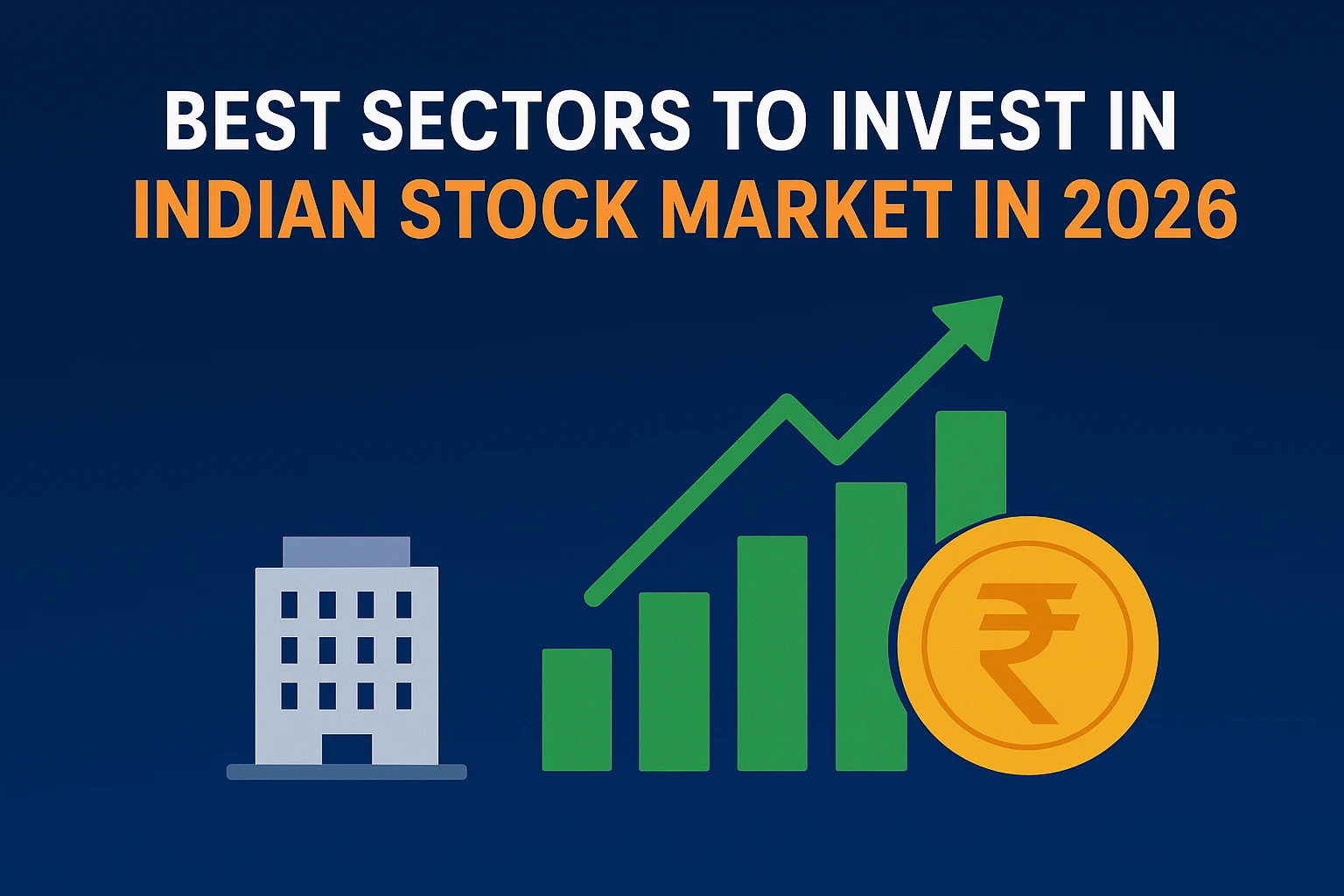The Indian stock market is entering 2026 with strong momentum and investor confidence. With India projected to remain one of the world’s fastest-growing major economies, the best sectors to invest in the Indian stock market in 2026 are expected to offer a mix of high growth, innovation, and structural resilience.
Driven by rising domestic consumption, infrastructure expansion, and government reforms, the market is likely to remain attractive for both retail and institutional investors. This article explores the top-performing sectors, key trends, and expert insights to help you make informed investment decisions in 2026.

How to Choose the Right Sector for Investment in the Indian Stock Market
Before diving into specific sectors, it’s essential to understand the factors that make a sector investment-worthy:
- Growth Potential: Choose industries aligned with India’s economic priorities — digitalization, green energy, and manufacturing.
- Government Policy Support: Sectors with Production Linked Incentives (PLI) schemes tend to perform better.
- Earnings Visibility: Look for consistent cash flow and margin stability.
- Valuation & Timing: Avoid overheated sectors; enter during corrections or early growth phases.
Top Sectors to Invest in the Indian Stock Market in 2026
1. Banking and Financial Services Sector in India 2026
The banking and financial sector remains the backbone of India’s economy. With improved asset quality, rising credit demand, and digital financial adoption, this sector is poised for robust growth in 2026.
- Rising credit penetration in rural and SME sectors.
- Expansion of digital payments and fintech innovations.
- Consolidation among public and private sector banks improving efficiency.
Top Picks: Private banks, NBFCs, fintech enablers.
2. Information Technology (IT) and Software Services – A Key Stock Market Sector for 2026
The IT sector continues to drive India’s export story with global companies increasing digital transformation spending.
- Rising demand for AI, cloud computing, and cybersecurity.
- Mid-cap IT firms offering niche AI-based services.
Top Picks: Infosys, TCS, LTIMindtree, Persistent Systems.
3. Healthcare and Pharmaceuticals – Long-Term Investment Sector
The healthcare and pharma sector remains a defensive and high-growth area with expanding domestic and export opportunities.
- Affordable healthcare schemes and hospital expansions.
- Export growth in U.S. and European markets.
Top Picks: Sun Pharma, Dr. Reddy’s, Apollo Hospitals, Lupin.
4. Renewable Energy and Power – Best Green Sector to Invest in 2026
India’s transition to green energy is a major structural theme for the next decade.
- Government incentives for solar, wind, and hydrogen energy.
- Corporate sustainability targets driving renewable demand.
Top Picks: Adani Green, NTPC Green, Tata Power Renewables.
5. Infrastructure and Construction – Growth Engine of Indian Economy
Infrastructure remains one of the best sectors to invest in 2026 due to heavy government spending on urban and rural projects.
- National Infrastructure Pipeline and Gati Shakti Mission.
- Affordable housing and road development projects.
Top Picks: L&T, IRB Infra, NCC, Ultratech Cement.
6. Automobile and Electric Vehicles (EVs) – Emerging Stock Market Sector
The automobile and EV sector is entering a high-growth phase, supported by sustainability goals and government incentives.
- Strong EV adoption across two-wheelers and passenger cars.
- Expansion of charging infrastructure and battery tech.
Top Picks: Tata Motors, Mahindra Electric, Exide, Bosch.
7. Defence and Aerospace Sector – Strategic Investment Opportunity
India’s push for self-reliant defence manufacturing creates huge potential for long-term investors.
- Growing local procurement and export opportunities.
- Collaborations with private technology companies.
Top Picks: HAL, Bharat Dynamics, BEL, Data Patterns.
8. Consumer Goods and FMCG – Stable Stock Market Sector for 2026
The FMCG and consumer goods sector will benefit from rising disposable income and digital retail penetration.
- Urban lifestyle changes and rural consumption recovery.
- Premiumization and e-commerce expansion.
Top Picks: Hindustan Unilever, Nestlé, Britannia, Godrej Consumer.
Key Trends Shaping the Indian Stock Market in 2026
- Digital transformation through AI, fintech, and automation.
- Sustainability and ESG investing trends rising sharply.
- Retail investor participation increasing rapidly.
- Strong global fund inflows into Indian equity markets.
Risks to Watch Before Investing in Indian Stock Market 2026
- Global slowdown or recession in major markets.
- Inflation and rising interest rates affecting valuations.
- Geopolitical risks and commodity price volatility.
- Overvaluation in certain high-growth sectors.
FAQs – Investing in the Indian Stock Market in 2026
1. Which sector will perform best in 2026?
Banking, IT, renewable energy, and defence sectors are expected to lead due to strong fundamentals and policy support.
2. Is it safe to invest in Indian stocks in 2026?
Yes, but diversification across sectors is important to manage risk.
3. What are the best long-term growth sectors in India?
Renewables, IT, healthcare, and defence sectors show strong long-term potential.
4. Should beginners invest directly or via mutual funds?
Beginners can start with sectoral or thematic mutual funds before buying individual stocks.
Conclusion – Final Thoughts on the Best Sectors to Invest in 2026
India’s economy is well-positioned for strong growth supported by reforms, domestic demand, and innovation. The best sectors to invest in the Indian stock market in 2026 — Banking, IT, Healthcare, Renewables, Infrastructure, Automobiles, Defence, and FMCG — offer sustainable long-term opportunities.
Focus on quality companies, diversification, and long-term holding to benefit from India’s growth story. Stay informed through reliable market resources like NSE India for accurate stock data and updates.


